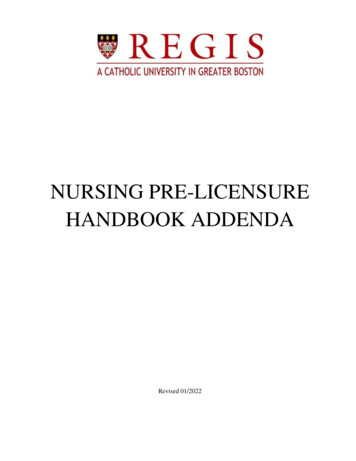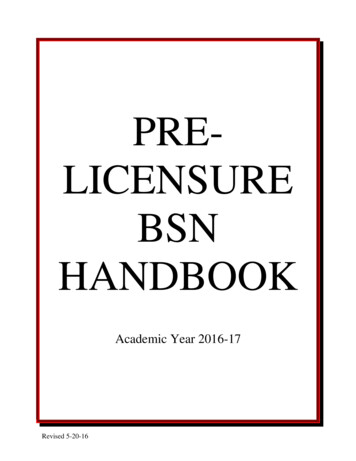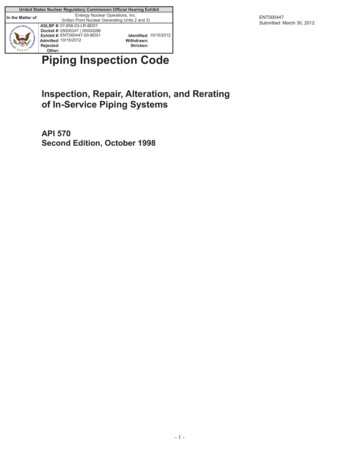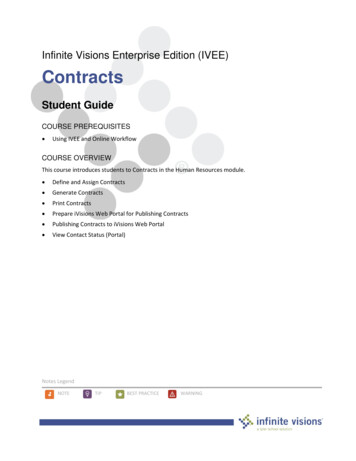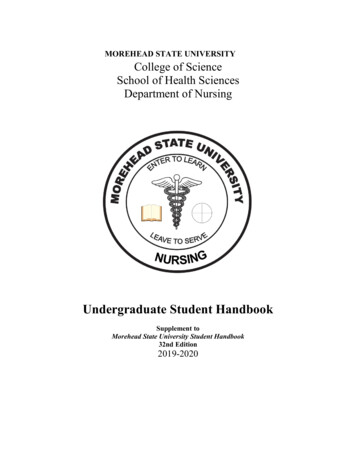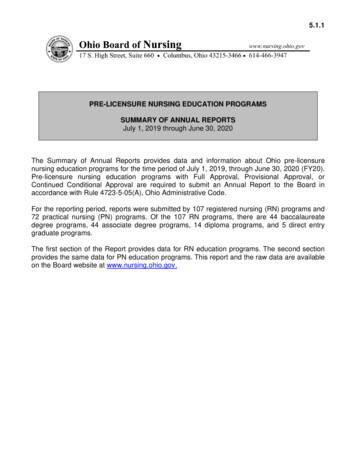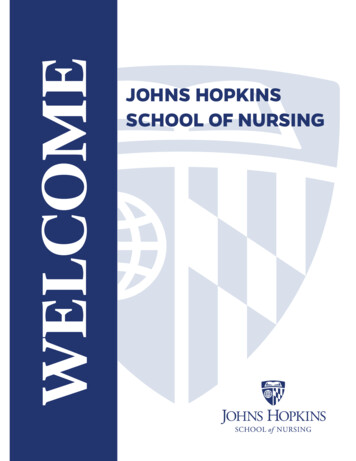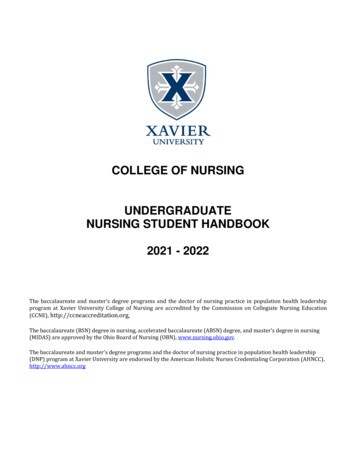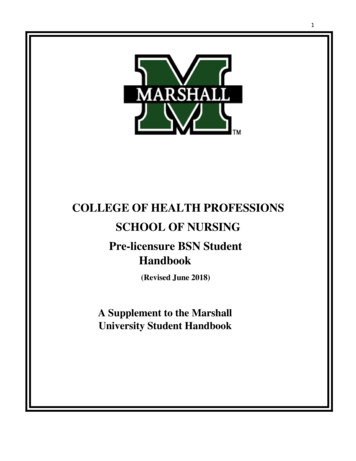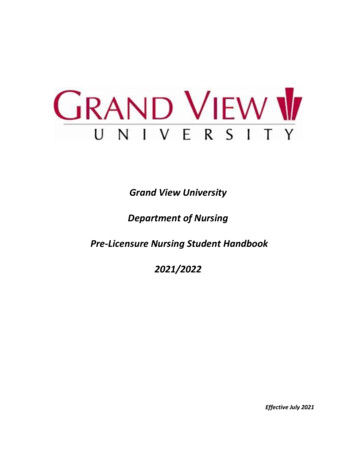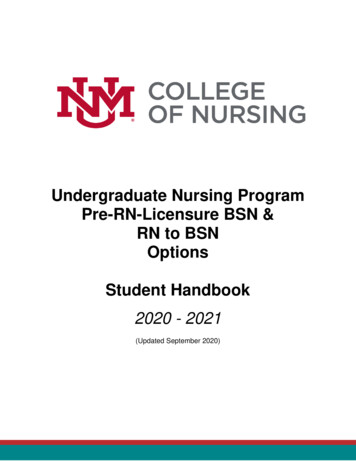
Transcription
NURSING PRE-LICENSUREHANDBOOK ADDENDARevised 01/2022
Regis College Young School of Nursing HandbookTable of ContentsINTRODUCTION . 4PURPOSE . 5DEFINITIONS . 5MISSION OF REGIS COLLEGE . 5PHILOSOPHY OF THE NURSING PROGRAM . 5I. GENERAL INFORMATION FOR ALL PRELICENSURE NURSING STUDENTS: . 6I. A. Professional Behavior Standards .6I. A.1. American Nurses Association Code of Conduct . 6I. A 2. Communication. 7I. A.3 Confidentiality . 7I. A 4. Social Media Use . 7Behavioral Expectations .7Good Moral Character . 8II. THE PRELICENSURE NURSING PROGRAM . 8II. A. General Information .8II. A 1. Pre-licensure Admission. 8II. A 2. Program Learning Outcomes Level I Student Learning Outcomes . 8II. A 3. ATI Comprehensive Assessment & Remediation Program . 9II. A 4. National Council Licensure Examination (NCLEX) Preparation . 9II. A 5. Sigma Theta Tau International Pi Epsilon Chapter-At-Large . 9II. B. Pre-licensure Academic Policies .9II. B 1. Academic Advising . 9II B. 2. Prerequisite and Corequisite Courses . 10II. B 3. Program Progression. 10II. B 4. Examination Policy. 10II. B 5. Day of Testing Process Policy . 10II. B 6. Examination Makeup Policy . 11II. B 7. Course Grading . 11Classroom: . 12Medication Safety and Calculation Exam (MSCE) . 12Clinical: . 13Simulation Lab: . 13II. B 8 Dismissal based on Grades: . 13II. B 9. Withdrawal and Leave of Absence . 14B 10. Validation Testing – Pre-licensure . 14II. B 11. Application for Readmission After Dismissal from the Nursing Program. . 15II. B 12. Medical Clearance . 15II. B 13. Academic Warning . 16Disciplinary Process. 16ACADEMIC AND DISCIPLINARY ACTIONS . 16Clinical Warning . 16Dismissal from the Nursing Program . 17Appeal of Disciplinary Action . 17Other Regis College Student Conduct Processes. 172
Regis College Young School of Nursing HandbookPolicy Appeal . 17NURSING CLINICAL POLICIES. 17Requirements for Clinical Experience . 17Students Participation in Class and Clinical . 18Clinical Assignments . 19Selection of Clinical Preceptors and Preceptorship Placements: . 19Clinical/Preceptorship Assignment Requirements . 20Immunizations. 20Drug Testing . 20Background Checks . 21Additional Background Checks . 21Academic Impact of Background Checks. 21Transportation Policy . 22Dress Code . 22Clothing/Uniform:. 22I.D. Badge: . 22Grooming: . 22Jewelry/Tattoos: . 22Behavior at the Clinical Site .23Smoking: . 23Telephone/ Pager/ Cell Phone/Smart Watches: . 23Prohibited Conduct . 23Confidentiality Standards. 24Patient Information and the Health Insurance Portability & Accountability Act Of 1996 . 24Critical Exposure, Injuries and Incidents . 25Definitions: . 25Guidelines Following an Exposure, Injury or Incident . 25Clinical Attendance . 26Cancellation of Clinical Experience by Faculty . 26NCLEX Examination Approval .26APPENDIX A . 27Nursing Program ARPC Petition Form . 27APPENDIX B . 29Report of Exposure, Injury, or Incident Form . 29APPENDIX C . 31Undergraduate Admission Requirements . 313
Regis College Young School of Nursing HandbookINTRODUCTIONDear Regis College Nursing Student:The Regis College Young School of Nursing Handbook (“Handbook”) is a supplement to theRegis College Academic Catalog (“Academic Catalog”) and students are subject to therequirements stated in both documents. The Handbook applies to nursing studentsspecifically and will supersede the Academic Catalog regarding the specific subject mattercontained herein.Students are also subject to the requirements of the Regis College Student Handbook.The Regis College Young School of Nursing updates the Handbook on an annual basis butreserves the right to make changes at any time on an as needed basis and will notify thestudents accordingly.Revised copies will be posted on the Regis College Nursing website and circulated to allmatriculated nursing students.Diane M Welsh DNP, RN, CNEDean, Young School of Nursing4
Regis College Young School of Nursing HandbookPURPOSEThe purpose of this Handbook is to present policies specific to the duties and responsibilitiesof students enrolled in pre-licensure programs. The Regis College Young School of Nursingupdates the Handbook on an annual basis but reserves the right to make changes at any timeon an as needed basis and will notify the students if and when changes are made. Students aresubject to the most recent version of the Handbook.Students are also responsible for complying with the Regis College Student Handbook andthe Regis College Academic Catalog. The Handbook applies to nursing students specificallyand will supersede the Academic Catalog regarding the specific subject matter containedherein.DEFINITIONSPre-Licensure Students are defined as traditional Undergraduate Baccalaureate (UG),Accelerated Baccalaureate (ABS), and 24-month Baccalaureate nursing students. DirectEntry Masters (DEM) nursing students in the pre-licensure phase of their program are alsoPre-Licensure Students and will follow the pre-licensure policies until completion of theBaccalaureate Degree Requirements. Post-Licensure Students are defined as students whohave a license to practice nursing as a Registered Nurse. Post-Licensure Students includeGraduate Students in the post-licensure phase of their degree program or any student who isa Registered Nurse enrolled in an individual graduate course (Masters or Doctorate level) butis not enrolled in a degree program, or is enrolled in a certificate program.MISSION OF REGIS COLLEGERegis College, through education in the arts, sciences, and professions, empowers womenand men to challenge themselves academically, to serve and to lead. A Catholic college,Regis is a diverse and welcoming community guided by the values of the Sisters of St.Joseph of Boston. (http://www.regiscollege.edu/about regis/mission.cfm)PHILOSOPHY OF THE NURSING PROGRAMThe Young School of Nursing is an integral component of Regis College. In concurrencewith the mission of the College, the nursing faculty accepts the responsibility of providing anenvironment in which the learner can gain a breadth of knowledge in the humanities, naturalsciences, and social sciences, as well as an in-depth understanding of one sector of learning.The faculty believes that by fostering professional growth, they encourage the student tobecome a positive influence on the nursing profession and society.5
Regis College Young School of Nursing HandbookThe Young School of Nursing is committed to the education of nurses from theUndergraduate through the Doctoral level. The faculty believes that multiple levels ofnursing practice exist. The nursing education program at Regis College provides the structurefor multiple entry and exit points along the continuum of the nursing profession, beginningwith the associate degree and continuing through the doctoral degree. The program builds asolid foundation for future endeavors in professional development and educational mobility.The nursing faculty believes the central concepts of the discipline of nursing are person,environment, health, and nursing. These four concepts are viewed generically. The conceptof person may refer to individuals, families, groups, communities, organizations, or societyas a whole. Every person has inherent dignity, worth, and individuality and a right tocomprehensive, compassionate health care. The person is a unique biopsychosocial, cultural,and spiritual being who continuously interacts with the environment throughout the lifespan.Environment refers to all the conditions, circumstances, and influences surrounding andaffecting the development of the person. It refers to all possible internal and external stimulithat may influence behavior and adaptation. It may be considered past, present, and future butis always seen in the context of the present.Health is a dynamic state of being and becoming integrated and whole in which theindividual adapts to changes in the environment.Nursing, as an art and science, is a developing system of knowledge about persons, health,and their environment. Further, nursing is unique in the way it synthesizes the liberal arts andthe physical, biological, and social sciences through the use of nursing process in the designand delivery of therapeutic nursing interventions for individuals, families, groups, thecommunity, and society.I. GENERAL INFORMATION FOR ALL PRELICENSURE NURSINGSTUDENTS:I. A. Professional Behavior StandardsI. A.1. American Nurses Association Code of ConductIn addition to the Regis College Student Handbook, students must comply with the standardsand codes developed by the American Nurses Association. The Young School of Nursingmay withdraw a student, without prior notice, from the nursing program who does notmaintain an acceptable level of behavior as defined in the American Nurses AssociationCode of Ethics6
Regis College Young School of Nursing HandbookI. A 2. CommunicationConsistent with the Regis College Student Handbook, the nursing program administrators,faculty, and staff use the Regis College email to communicate with students. Students arerequired to communicate electronically with program administrators, faculty, and staffexclusively through Regis email/Moodle/Starfish. It is the responsibility of the students tocheck their emails daily during the academic year and intermittently during extended schoolbreaks.I. A.3 ConfidentialityAt the beginning of each clinical experience students are to sign a confidentiality and privacypolicy statement attesting that they have read and understood and will follow the HealthInsurance Portability and Accountability Act (HIPAA) guidelines as well as the policiesoutlined by that clinical agency. Refer to Confidentiality Standards and to PatientInformation and the Health Insurance Portability and Accountability Act of 1996 underNursing Clinical Policies further in this handbook for detailed information.I. A 4. Social Media UseProfessional values, ethical standards, and adherence to privacy requirements, includingthose enacted by the Health Insurance Portability and Accountability Act (HIPAA) extend toall forms of social media. Violations in relation to these professional standards and behaviorsmay result in exclusion from the nursing program. Students should be aware of, consider,and comply with the Massachusetts Board of Registration in Nursing regulations, as well asthe state Board of Registration of Nursing regulations in which they are practicing, wheneverusing social and electronic media. These regulations may be updated and change during thetenure of a student’s training. Visit ations-for-the-board-of-registration-in-nursing for more information. Additionally, TheNational Council of State Boards of Nursing, in its White Paper: A Nurse’s Guide to the Useof Social Media, https://www.ncsbn.org/Social Media.pdf, has identified guidelines thatstudents must adhere to. Students must adhere to all clinical agency social media policies.Any unauthorized uploaded course assignments, exams or other course resources to anysocial media site will be a violation of this policy.Behavioral ExpectationsNursing students at all levels must display specific professional behaviors and conductthemselves in a professional manner at all times. Specific professional behaviors include, butare not limited to:1. Attending each class, lab and clinical experience on time and for the duration of theexperience.2. Respectful communication, including electronic communication, when interactingwith faculty, staff, peers, patients, families and members of the health care team.3. Maintaining professional boundaries with patients, families and members of thehealth care team.7
Regis College Young School of Nursing Handbook4. Refraining from using cell phones and electronic devices while engaged in learningactivities unless otherwise directed.5. Observing the Regis College Classroom Code of Conduct as stated in the RegisCollege Academic Catalog.Good Moral CharacterThe Commonwealth of Massachusetts Board of Registration in Nursing Licensure Policy 00011 Determination of Good Moral Character identifies specific criminal convictions, whichwill permanently exclude an individual from initial Nurse Licensure in all individual statesdue to the egregious nature of the crime. The policy also requires initial Nurse Licensureapplicants to be conviction-free for minimum of five years before the submission of anapplication for initial Nurse Licensure. In addition, the disposition of any criminal convictionmust be closed for a minimum of one year before the submission of a Nurse Licensureapplication; any other criminal case must also be closed at the time of application. Pleaserefer to the most current policy online at: https://www.mass.gov/service-details/good- I. THE PRELICENSURE NURSING PROGRAMII. A. General InformationII. A 1. Pre-licensure AdmissionAdmission policies related to the pre-licensure Nursing programs are located on Appendix Cof this handbook and on the Richard and Sheila Young School of Nursing Website.II. A 2. Program Learning Outcomes Level I Student Learning OutcomesSLO 1. Integrate knowledge of the natural and behavioral sciences and the humanities whenimplementing the nursing process to achieve culturally competent therapeutic nursinginterventions and promote adaptation of individuals, families, groups and the community inprimary, secondary and tertiary levels.SLO 2. Implement nursing and related theories and research in developing critical thinkingskills in systems based nursing practice to achieve therapeutic nursing interventions instructured and unstructured settings.SLO 3. Establish effective therapeutic communication skills with individuals, families, groups,the community and members of the health care team to strive for optimal wellness andadaptation.SLO 4. Use informatics and selected technology to accumulate data and analyze knowledgegained through an evidence-based approach to nursing practice to accumulate data toimprove and boarded the scope of nursing care.SLO 5. Promote the rights of individuals, families, groups and the community according tolegal and ethical standards of the nursing profession.SLO 6. Integrate leadership and management skills in meeting health needs and improved8
Regis College Young School of Nursing Handbookpatient outcomes in a variety of settings.SLO 7. Internalize responsibility for continued learning and professional development.SLO 8. Contribute to change in health care systems to improve the professional role ofnursing and the delivery of safe, quality health care.SLO 9. Analyze teaching and learning principles in the care of individuals, families, groupsand the community in structured and unstructured settings.II. A 3. ATI Comprehensive Assessment & Remediation ProgramAssessment Technologies Institute (ATI) Comprehensive Assessment and RemediationProgram is used in each of the Pre-Licensure Nursing courses during the program to helpstudents demonstrate mastery of nursing content and to identify the need for remediation.Additionally, it will assist students to be prepared upon graduation to pass the nursinglicensing examination. The ATI provides a review program for these exams including reviewbooks and resources along with online practice and proctored exams in major content areas innursing.II. A 4. National Council Licensure Examination (NCLEX) PreparationAt the completion of the Pre-Licensure portion of the nursing program, all students take acomprehensive standardized examination. An approved NCLEX review course based on thisexamination is provided in early January for students completing bachelor's requirements inDecember and immediately after graduation in May for all other students. It is highlyrecommended for all students. It is also highly recommended that students complete theirNCLEX preparation through a comprehensive virtual online tutor before sitting for theNCLEX examination.II. A 5. Sigma Theta Tau International Pi Epsilon Chapter-At-LargeSigma Theta Tau International, the Honor Society of Nursing, is committed to fosteringexcellence, scholarship and leadership in nursing to improve health care worldwide. TheSociety promotes the use of nursing research in health care delivery and makes its resourcesavailable to all people and institutions interested in the latest knowledge in nursing care.Pi Epsilon-at-Large inducts new members annually in the spring, including eligiblebaccalaureate nursing students, graduate level nursing students, and community members;eligibility is different for each level of induction. Specific membership information andapplications are available in the Office (CH 120) and on BSN and MSN Connections.II. B. Pre-licensure Academic PoliciesII. B 1. Academic AdvisingStudents are responsible for contacting their advisor to determine the accuracy of theircurriculum plan and assess their progress towards degree completion. The students’ advisor’sname can be found on his/her profile on Regis Access and on Starfish. During eachsemester’s scheduled week of advising for the purposes of registration of courses for the9
Regis College Young School of Nursing Handbookfollowing semester undergraduate nursing students must schedule a time with their advisorfor an on-campus face-to-face meeting. For second-degree pre-licensure nursing programs,advising for registration may be performed face-to-face, via Moodle, or other electronicplatforms such as Skype or Zoom.For advising matters other than course registration, advising can be face-to-face, over thetelephone, via email, or through other available technology.II B. 2. Prerequisite and Corequisite CoursesThe minimum required grade for non-Nursing prerequisite and corequisite courses is a C (2.0). Theexception being a B- (2.7) for ID 230, The Interdependence of Healthcare Professions in the U.S. If astudent receives below the minimum required grade in any non-Nursing prerequisite or corequisitecourse, they will have one (1) opportunity to repeat one (1) prerequisite or corequisite non-Nursingcourse and achieve a passing grade. If a student fails to achieve the required minimum grade in morethan one (1) prerequisite or corequisite non-Nursing course, they will not be eligible to apply to orremain in the Nursing program.II. B 3. Program ProgressionStudents must take Nursing courses in sequence as designated on the curriculum plan fortheir program and projected date of graduation. Permission to register for courses out ofsequence may be granted only by the Program Director or Associate Dean for the YoungSchool of Nursing or designee.Undergraduate students may not register for courses outside of their program. Studentsregistered in second-degree programs wishing to enroll in a different second-degree programwill bring any course failure(s) with them. For example a student enrolled in the DEMprogram who wishes to change to the ABS-program after receiving a C in NU-624D willtransfer into the ABS program the C as a course fail grade for NU 324B. The C will count asthe first failure of the program.II. B 4. Examination PolicyDates of examinations and quizzes are not negotiable; students must take the examination orquiz on the day and time stated in their course syllabi. No examinations or quizzes will begiven early. Students are expected to make travel plans that commence after all testing andcourse requirements are completed; students who do leave campus early due to travel willreceive an unexcused absence.II. B 5. Day of Testing Process PolicyOnce testing begins, the door will be shut and no student will be allowed to enter. Thestudent must speak with their course faculty immediately following the scheduled exam. Theexam will be made up later per the Examination Makeup policy with 10% deduction. Thereare no exceptions permitted.Students must bring a fully charged portable electronic device (laptop, iPad, tablet) withtesting software (Respondus) preloaded. Phones are not permitted as a test-taking device.10
Regis College Young School of Nursing HandbookViolation of the following are considered an Academic Integrity violation: Students are not permitted to have cell phones or other electronics, other than theirtesting device, with them during testing.All backpacks and belongings, are to be placed in the front or on the side room, perfaculty direction. All cell phones must be turned off or placed on Silent.Once testing starts, if a student requests to leave the room, unless the student has adocumented accommodation, the student must submit the test as completed.No watches/Fitbit, etc. may be worn during testing; students’ wrists must be exposed.Hats with brims must be turned around with the brim to the back of the head.No garments with hoods are permitted to be worn during testing.Clear beverage bottles, such as water bottles, must have the label removed or bebrought to the test proctor for approval.No ear buds or headphones are permitted. Students may use foam ear plugs only;students must notify the test proctor beforehand.Moodle and Lockdown Browser logs will be reviewed by course faculty and anyconcerning behavior will result in a formal response from the student.II. B 6. Examination Makeup PolicyIf, due to extraordinary circumstances, a student is unable to take an examination on thescheduled date the student is expected to provide official documentation and a completedExcused Absence form, within 48 hours to support the missed examination as an excusedabsence.Make-up examinations will be held during Common Time at midterm and at the end of theregular semester. There will be two dates selected, students are required to makeup exams onthese dates. Final examinations will be made-up on a date scheduled by the faculty and mayresult in an Incomplete for the course. Make-up examinations may be given in a differentformat, at the discretion of the course faculty, including but not limited to short answer, fillin-the-blank, essay, etc. In the event that a student fails to take the scheduled make-upexamination or quiz, the student will earn a grade of zero (0%) on that examination.Ten percent (10%) of the total possible score will be deducted from any make-up of any nonexcused examination or quiz, including final examinations. Students who need to make up aNursing final exam due to an unexcused absence will make up the exam on the designatedcollege final exam makeup date. This will affect students’ progression into the next semester.Students will not start the next semester’s classes or clinicals until after the final exam hasbeen taken, graded, and the student has received a passing course grade.II. B 7. Course GradingA minimum course grade of B- (80%) is required for a student to receive a passinggrade in all Nursing courses.11
Regis College Young School of Nursing Handbook At the end of the semester, both the final course grade and objective testinggrade will be ca
Entry Masters (DEM) nursing students in the pre-licensure phase of their program are also Pre-Licensure Students and will follow the pre-licensure policies until completion of the Baccalaureate Degree Requirements. Post-Licensure Students are defined as students who have a license to practice nursing as a Registered Nurse.
